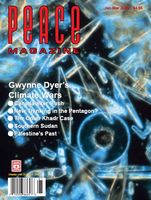
Peace Magazine Jan-Mar 2009, page 29. Some rights reserved.
Search for other articles by Shirley Farlinger here
By Douglas Roche. Novalis, 2008.
After reading this autobiography of a distinguished former member of parliament, former senator and Order of Canada recipient, I can't refer to him as the Honorable Mr. Roche. He is too personable, humble and likeable, so I will call him Doug.
Doug says "I want the reader to know who I am, where I came from, and how my ideas for peace developed." The reader also learns of Doug's global reach, his myriad influential friends from Michael Douglas to the Pope, and his constant travels to conferences.
He weaves in his family concerns as he helps raise his four children, one a special needs child with first wife Eva and stepchildren with second wife Pat. The family times show his caring and fun side.
It started in Montreal on June 14, 1929, the year remembered for the stock market crash and depression. Doug is of Irish Catholic stock. His great-grandfather arrived from Ireland to Ontario in 1842. His father became a friend of Premier Leslie Frost, who urged Doug to run in the riding where his grandfather had lived. Doug replied, "I'll never become a politician." Later a trip to Rome for a friend's ordination gave Doug his first encounter with the Pope. "I'm going to be a priest!" he blurted out. His life could be described as part-politician, part-priest.
In school Doug edited the school paper and later worked at the Ottawa Journal where he learned to get it right and get it fast -- great training for his speeches, reports, and 19 books. When money was scarce he could earn a bit by dashing off a piece for the local paper. He switched to various Catholic papers, bringing social justice into his writing, covering what he saw as a great awakening in the Church after Vatican II.
His paper, The Western Catholic Reporter won awards but "the board seemed overwhelmed by complaints from this or that person about this or that article." Doug was asked to moderate editorial disputes about abortion (he is adamantly and eloquently against it) and abuse in the Catholic Church.
"My faith was no longer a comfort to me, rather it had become a challenge."
Doug's next moved into politics. "Winning a seat (in Edmonton) was easy but the next years as a back bencher in opposition to Trudeau were not." Doug became known for his work on global issues. When friend Joe Clark finally won, Doug asked to be United Nations Ambassador but was instead offered the job of Ambassador for Disarmament. That led to dissension with activists in the peace movement. Even as we sat on the Consultative Group tasked with advising the Ambassador, we saw the establishment frustrate our hopes for the end of Cold War thinking. Doug traveled the country making speeches and urging citizens to take a more active role against nuclear weapons. He talked to Ernie Regehr, Lloyd Axworthy, Pierre Trudeau, and global leaders such as Willy Brant and Inga Thorsson, as he organized Parliamentarians for Global Action and worked with the Non-Aligned Movement and the Middle Powers Initiative, traveling the world to gain support. These groups, including the Pugwash Movement, are still at it.
His work continued after his 12 years in Parliament and his 600 interventions ended. All parliamentarians praised Doug, even as they referred to him as radical and too idealistic. Our membership in NATO often was used as an excuse for inaction.
In 1983 one million people marched in New York and 90 million signed a pledge for peace, but this was largely ignored. "Rage was building inside me," he recalled.
Freed of politics in 1990, he continued to write and began to lecture at the University of Edmonton. Then, unexpectedly, Doug was asked to join the Senate, which he would only do as an independent. He was back in politics for five more years. His award of the Order of Canada "made me want to work even harder."
The fight of Doug's 80-year life has become the struggle to rid the world of nuclear weapons. He has concluded that "the abolition of nuclear weapons is the indispensable condition for peace in the twenty-first century." "Nuclear weapons do not prevent evil -- they are evil." He also sees this goal as indispensable for the alleviation of global poverty. Disarmament could help development.
There is hope now as nations debate a UN Convention on the Abolition of Nuclear Arms and even diehards such as Henry Kissinger and George Shultz have changed their tune. Oh say, they can finally see what others have seen for a long time. This book is a good start.
Shirley Farlinger is a Toronto activist.

Peace Magazine Jan-Mar 2009, page 29. Some rights reserved.
Search for other articles by Shirley Farlinger here